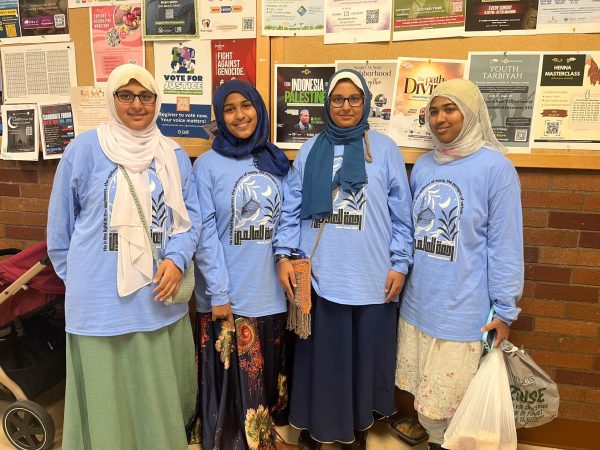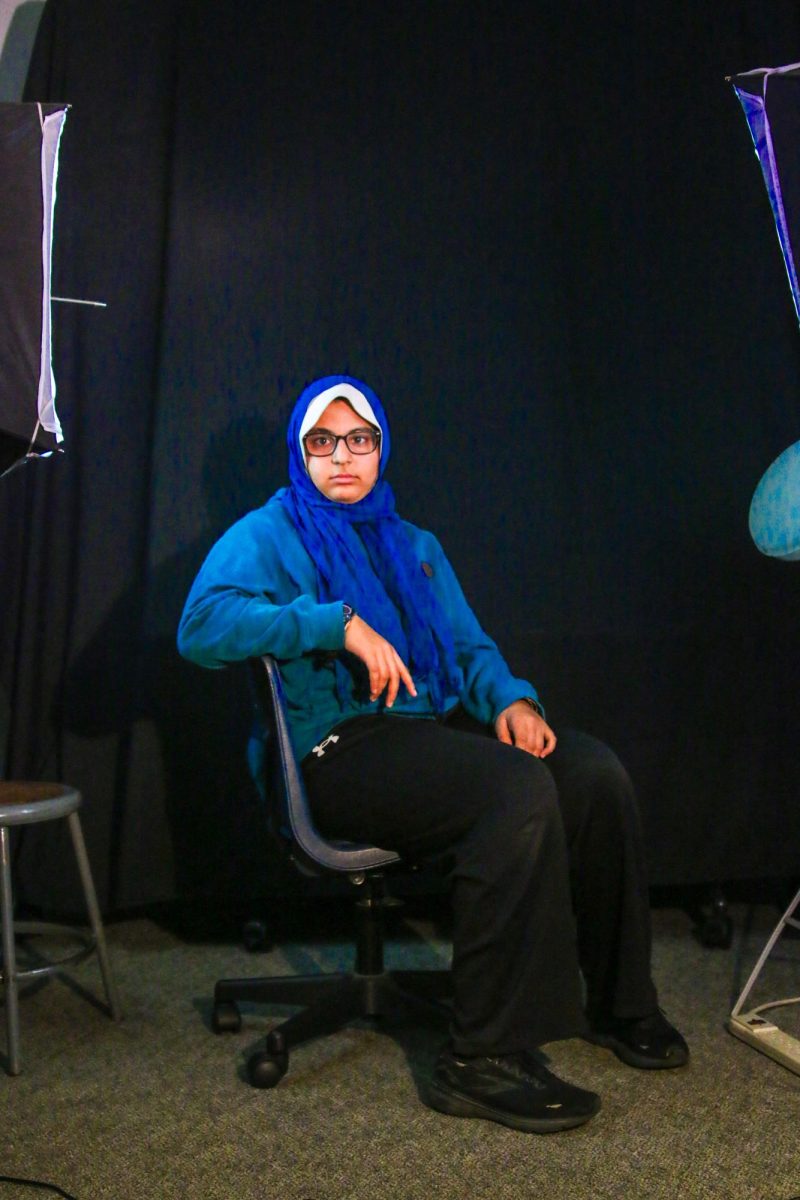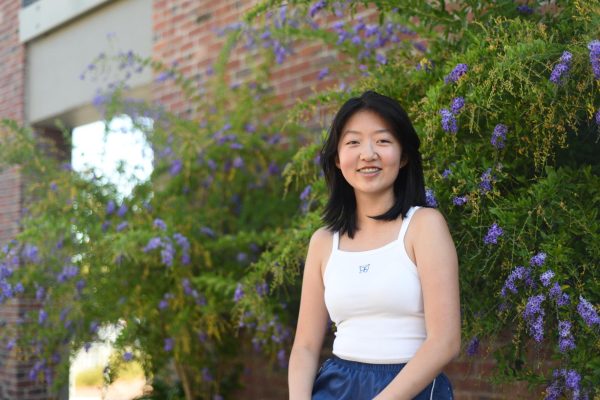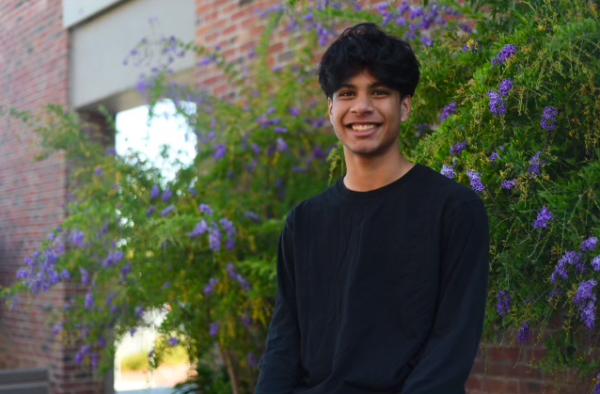The distinct smell of petrol floods junior Mariam Mansour’s senses, and upbeat car honks, signifying a recent wedding, electrify the air. Even the park she walks through with her cousin buzzes with energy: music blasts from speakers while children play and adults mingle or dance. Although Mariam rarely participates in these nighttime festivities — preferring to observe by her older cousin’s side instead — in moments like these, she feels completely at home and connected to her culture and family.
However, Mariam hasn’t always felt comfortable with her connection to her Egyptian culture. Even though she speaks almost exclusively Arabic at home, her proficiency is not as strong as her family members in Egypt, leading to occasional difficulties communicating with her extended family. As a result, her parents enrolled Mariam and her twin sister student Hend Mansour, in an Arabic class to help them understand the Quran, which is the central religious text of Islam. Mariam says she loves studying the text.
“Each class, my teacher teaches half a page from the Quran, its meaning and how it is applied to our everyday life,” Mariam said. “When we meet the following week, she expects that we memorize the half page she taught, and it’s been so much easier because before the class, I was memorizing without understanding the meaning. These classes have made me want to learn more about the Quran and connect more to my religion.”
Another aspect of the class that Mariam appreciates is the opportunity to interact with other Muslim students. Since she previously lived in Dallas, Texas, where there was a larger Muslim community, connecting with other Muslims at school was never difficult, but after moving to Cupertino, Mariam noticed that Muslims were a minority. Hend believes this difference becomes especially stark when reading books in class regarding Islam.
As a sophomore in World Literature, Hend read “Persepolis,” a graphic novel following author Marjane Satrapi’s experience growing up amid the Islamic Revolution in Iran under an oppressive government. While Hend enjoyed learning from the thoughtful way her teacher approached the book, she overheard discussions from her classmates that criticized aspects of Islam rather than analyzing Satrapi’s experience with the government.
“It made me uncomfortable, because I’m right here choosing to wear a hijab while they talk about the oppression it symbolizes,” Hend said. “Marjane wore a hijab because she was forced to. I think the book is never about Islam — it’s about the government who does the stuff to them. I feel like a lot of people in our class were oversimplifying.”
While experiences like these made both sisters uncomfortable, Mariam considers them lucky to be living in Cupertino. She says both the Dallas and Cupertino community have been accepting towards their faith, and neither sister has faced any overt discrimination. It wasn’t until a vacation to Hawaii that Mariam says she realized how lucky she is to have lived in these areas, recalling a moment where she was at the beach playing with her younger brother when an older man approached her.
“He looked at me and said, ‘F*ck you Muslims,’” Mariam said. “I told my dad what he said, but he wasn’t mad about it. He knew that outside of Cupertino, there were a lot of people who judged Muslims. Everywhere that I lived, I always felt safe. But I was never the same after this because I knew from now on that nowhere was safe, and where I was living was a delusion.”

The event heightened both Mariam and Hend’s self-consciousness regarding their religion. Both sisters wear hijabs, a religious practice for women in Islam. However, they notice that wearing hijabs publically marks them as Muslim. They recall feeling especially uncomfortable on Sept. 11, the anniversary of the 2001 terrorist attacks, where they both noticed unusual looks directed towards them.
“I don’t like to be noticeable,” Hend said. “We have to suffer because of what other people did, but we also suffer from what people perceive us as. They think almost every one of us is bad, but that’s not what Islam is. We’re supposed to treat others the same, and we’re not supposed to be a threat. We’re not supposed to be bad guys.”
Hend says this treatment is unfair because to her, the ones who perpetrated the Sept. 11 attacks were an extremist terrorist group. However, Mariam says that this is one of the unfortunate burdens that comes with being a minority: her actions could affect other people’s perceptions of all Muslims. Growing up, she says her parents always said in Arabic, ‘Keep our heads high and don’t do anything bad,’ because it would reflect on how people saw Muslims.
Hend notes that Muslims are often depicted as villains in American film and media — Mariam remembers people calling for the worldwide ban of hijabs on social media following the French ban of hijabs in certain sports at the Olympics. Mariam occasionally fears that people she knows in real life secretly harbor the same beliefs, but she still clings to her values. One of these values is kindness, which her close friend, junior Jyosshnaa Vijayasenthilnathan, says she embodies through her consistent willingness to help others.


 I feel like at MVHS, due to all the competition and pressure to get into a good college and ‘be the best’, some people aren’t really open to helping others,” Vijayasenthilnathan said. “Mariam took away from her own writing time to help me understand so that I could do well on my assignment. That was really kind of her. One act of kindness can go a long way because I still remember what Mariam did for me that day and I’m very grateful for her.”
I feel like at MVHS, due to all the competition and pressure to get into a good college and ‘be the best’, some people aren’t really open to helping others,” Vijayasenthilnathan said. “Mariam took away from her own writing time to help me understand so that I could do well on my assignment. That was really kind of her. One act of kindness can go a long way because I still remember what Mariam did for me that day and I’m very grateful for her.”
Mariam says that she tries her best to help everyone wherever she can. Many values that she considers important, such as goodwill and helping others, are a result of studying Islam.
“Being a Muslim teaches us how to be better,” Mariam said. “For example, if you see a man and he’s requesting somewhere to stay, it’s your job to take care of him. Or if somebody asks you for help and you’re not busy, you have to help him because what better way to spend your time than helping others? It teaches you that everybody needs help and somebody will always be there for you.”












